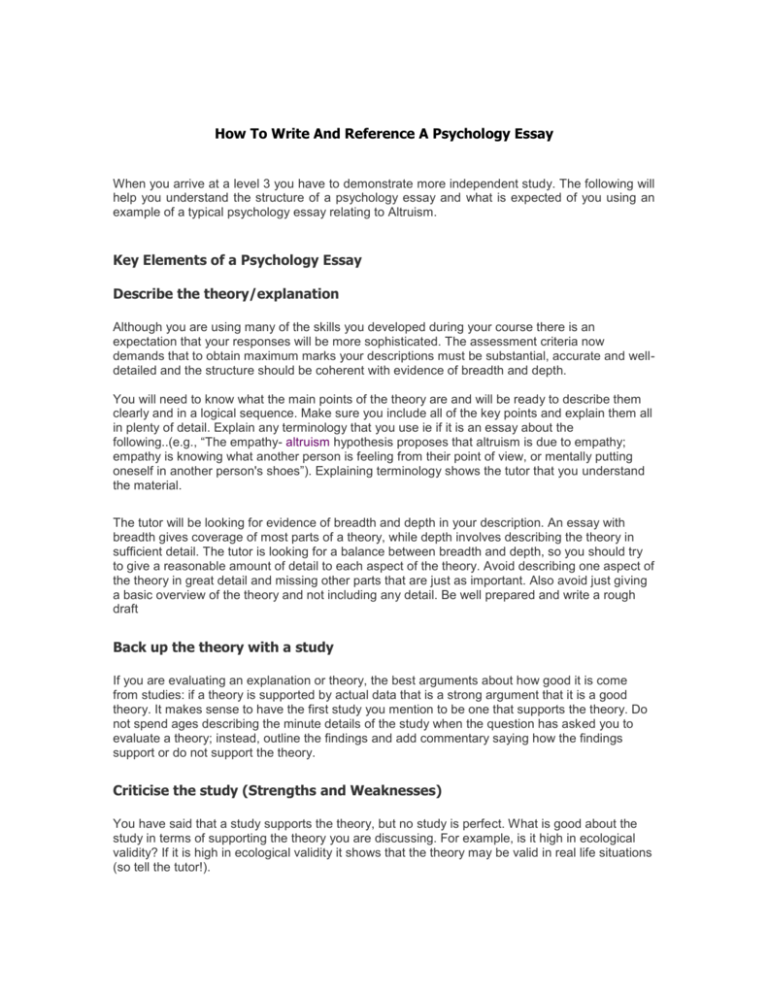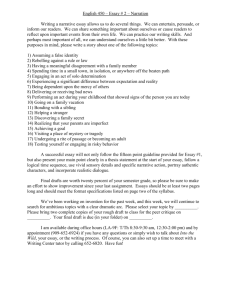How to write and reference a psychology essay
advertisement

How To Write And Reference A Psychology Essay When you arrive at a level 3 you have to demonstrate more independent study. The following will help you understand the structure of a psychology essay and what is expected of you using an example of a typical psychology essay relating to Altruism. Key Elements of a Psychology Essay Describe the theory/explanation Although you are using many of the skills you developed during your course there is an expectation that your responses will be more sophisticated. The assessment criteria now demands that to obtain maximum marks your descriptions must be substantial, accurate and welldetailed and the structure should be coherent with evidence of breadth and depth. You will need to know what the main points of the theory are and will be ready to describe them clearly and in a logical sequence. Make sure you include all of the key points and explain them all in plenty of detail. Explain any terminology that you use ie if it is an essay about the following..(e.g., “The empathy- altruism hypothesis proposes that altruism is due to empathy; empathy is knowing what another person is feeling from their point of view, or mentally putting oneself in another person's shoes”). Explaining terminology shows the tutor that you understand the material. The tutor will be looking for evidence of breadth and depth in your description. An essay with breadth gives coverage of most parts of a theory, while depth involves describing the theory in sufficient detail. The tutor is looking for a balance between breadth and depth, so you should try to give a reasonable amount of detail to each aspect of the theory. Avoid describing one aspect of the theory in great detail and missing other parts that are just as important. Also avoid just giving a basic overview of the theory and not including any detail. Be well prepared and write a rough draft Back up the theory with a study If you are evaluating an explanation or theory, the best arguments about how good it is come from studies: if a theory is supported by actual data that is a strong argument that it is a good theory. It makes sense to have the first study you mention to be one that supports the theory. Do not spend ages describing the minute details of the study when the question has asked you to evaluate a theory; instead, outline the findings and add commentary saying how the findings support or do not support the theory. Criticise the study (Strengths and Weaknesses) You have said that a study supports the theory, but no study is perfect. What is good about the study in terms of supporting the theory you are discussing. For example, is it high in ecological validity? If it is high in ecological validity it shows that the theory may be valid in real life situations (so tell the tutor!). Next, what weakness(es) does the study have, that mean(s) that it may not support the theory after all? (if it was high in EV then extraneous variables were probably not well controlled – can you think of an extraneous variable that may have affected the results? Choose extraneous variables that are particularly relevant!) Back up your criticism with a study that does not support the theory Again, just outline the findings and add some commentary explaining why this study does not support the theory. Strengths of this study Why is this study better than the previous one? Weaknesses of this study… Add more studies to support and refute the various aspects of the theory Do not forget the commentary! Contrast with another theory A strong argument against a study is that another theory provides a better explanation for the research findings. A full explanation of how and why the other theory is better will obtain more marks. Other possible strengths and weaknesses of a theory Is the theory plausible? Does the theory seem to make sense with regard to our everyday experiences. To get marks for this you must say how it relates to everyday experience. Gender bias – Has all the research been carried out on males? Are there assumptions that the theory makes that make it gender biased (e.g., Freud’s assumes that females are morally weaker than men; Kohlberg only used males in the research he used to develop his theory) Culture bias – Does the theory only apply to western cultures? Make sure you explain why. Is the theory unfalsifiable? Explain what this means. Summarise and Conclude Summarise the points you have made and make a general conclusion Essay Extract The socio economic level of the helper may also be a factor when determining altruism. Lowe and Ritchey (1973), using the lost letter technique, noted that return rates were affected by the socio economic level of the area, with more letters being returned from upper middle class areas than working class areas. Brown and Reed (1982) further support this finding in their study of lost letters attached to cars, noting that the return rates were significantly higher when letters had been left on high status cars. In today’s fast paced, stressful society the altruistic act can often be surprising since helping appears to cost, even if that cost is merely time-related. Therefore, to what does extent mood affect a person’s enthusiasm to be altruistic? Berkowitz and Connor (1966) found that a negative mood has a negative effect on an individual’s willingness to help. In their study involving school children, students who had been told they had failed a test donated an average 39 cents less to the school building fund than students who had been told they had passed. Berkowitz (1970) suggests that the individual is more generous because; ‘Success might enlarge his ability to empathise with others, while the unhappy failure could conceivably restrict it’ (Berkowitz 1970, pg 83). Interestingly Soames Job (1987), in his study of altruism and mood in rugby supporters, found quite the opposite. His study highlighted that negative moods induced a higher level of helping among supporters from the losing teams. All sources used in the essay are then in the reference list (see below). Berkowitz, L. The Self, Selfishness and Altruism. In Macaulay, J., & Berkowitz, L. (Eds) (1970). Altruism and Helping Behaviour. New York and London: Academic Press, pp. 143-151 Berkowitz, W.R (1970). Spectator Responses at Public War Demonstrations. Journal of Personality and Social Psychology, 14, 305-311 Berkowitz, L. and Connor, W.H. (1966) Success, Failure and Social Responsibility, Journal of Personality and Social Psychology, 4, pp. 664-669. Brown, C.E. and Reed, M.D (1982). Race, Cost and Car Status. Interactive Variables Using The Lost letter Technique. Psychological Reports 51, pp. 303-308 Lowe, R. and Ritchey, G. (1973) Relation of Altruism To Age, Social Class, And Ethnic Identity. Psychological Reports, 33, pp. 567-572. Soames Job, R.F. (1987) The Effect of Mood on Helping Behavior. Journal of Social Psychology, 127, pp. 323-328






